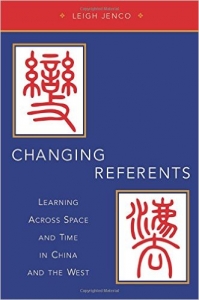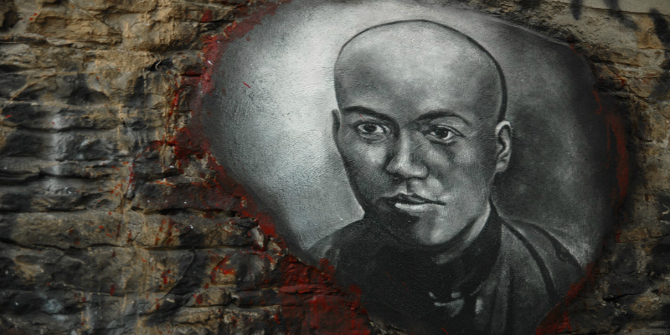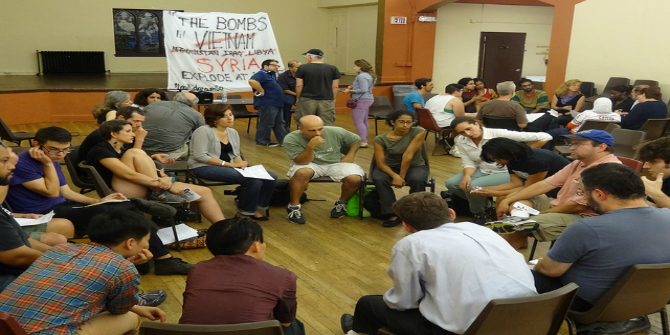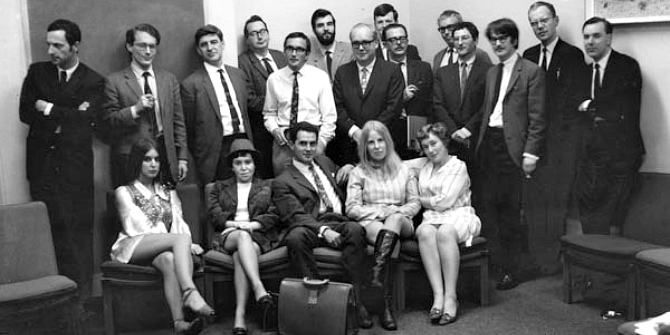In Changing Referents: Learning Across Space and Time in China and the West, Leigh Jenco challenges the assumption that academic thinking should proceed through the use of Eurocentric categories and concepts by instead tracing and drawing upon their implication in histories of Chinese thought, with a particular emphasis upon the notion of ‘Western Learning’. Although Xinyu Li would have welcomed more reflection on the contribution made by women to Chinese modernity under the circumstances of ‘Western Learning’, this thought-provoking volume utilises precise translations to present a methodologically intriguing and highly readable argument.
Changing Referents: Learning Across Space and Time in China and the West. Leigh Jenco. Oxford University Press. 2015.
 Changing Referents: Learning Across Space and Time in China and the West is written by the LSE-based scholar, Leigh Jenco, a specialist on modern Chinese thought and its intersections with contemporary political theories. She has also spent several years in China for academic purposes. Changing Referents is composed of nine chapters, aiming ‘to demonstrate an alternative possibility, which resists the idea that we cannot use non-Western thought for creative theorizing’ (1). To do this, it draws upon histories of Chinese thought as it ‘presents a series of perspectives that emerged through time’ (6).
Changing Referents: Learning Across Space and Time in China and the West is written by the LSE-based scholar, Leigh Jenco, a specialist on modern Chinese thought and its intersections with contemporary political theories. She has also spent several years in China for academic purposes. Changing Referents is composed of nine chapters, aiming ‘to demonstrate an alternative possibility, which resists the idea that we cannot use non-Western thought for creative theorizing’ (1). To do this, it draws upon histories of Chinese thought as it ‘presents a series of perspectives that emerged through time’ (6).
According to Jenco, the term ‘changing referents’ is perceived as bianfa in the Pinyin system. Significantly, both of these can be understood as the radical potential of revolutionary power derived from the Daoist classic The Book of Changes, which theorises primitive theosophy and oriental proto-science. In modern times, the Cantonese scholar and leader of the Hundred Days of Reforms, Liang Qichao (1873-1929), recontextualised the political ideology of ‘changing referents’ in his 1896 text, General Discussion on Reform (Bianfa tongyi).
Jenco particularly focuses on the concept of ‘Western Learning’, which originated in the late Qing dynasty. As a cultural defence against colonial armies from the West and Japan, it was further fashioned in the early Republican era after the Qing government’s advocates of the ‘Foreign Affair’ from 1861 to 1895, i.e. the May Fourth or the New Culture Movement in 1919.
Following an introduction, the first three chapters collectively explain the reasons why the (re)production of Western knowledge in China since the nineteenth century should not be simply regarded as an epistemological practice, but was rather based on the dynastic state’s complicated historical contexts. Jenco summarises how, in order to actualise economic and political ambitions, to learn language, logics and science from the ‘barbarian’ others was seen as a means to better control foreign powers.
Science is widely accepted as a modern invention of the west, bringing unexpected newness to motivate civilisations in moving forward. Critical and comparative opinions on scientific rationality with impressive case studies are provided. Chapter Five looks at the reformist Tan Sitong’s ‘totalistic Westernisation’ within his theoretical supports of a dao-cum-qi dichotomy. The two essential elements dao (meaning, way) and qi (technology, institution) interdependently brought social changes under the circumstances of ‘Western Learning’. Tan’s metaphysical account supposed ‘a more radical interpretation in which Chinese values and ways of life are fundamentally displaced by a Western dao rather than preserved by Western qi’ (129).
 Image Credit: Painted Portrait, Liang Qichao (thiery ehrmann)
Image Credit: Painted Portrait, Liang Qichao (thiery ehrmann)
Furthermore, Jenco analyses many rarely-discussed Chinese literati and their texts on science in Chapter Eight: for instance, the debate by Zhang Shizhao (1881-1973) over Chen Jiayi’s linguistic formula of creative forces and Zhang Dongsun’s (1886-1973) theory of four interactive relationships: namely, harmony, compromise, identity and co-existence. These arguments were issued through the pioneering Chinese magazine Eastern Miscellany in natural and social science, where Du Yaquan (1873-1933) served as the editor-in-chief from 1911 to 1920.
Jenco’s valuable inquiry enables the reader to see more clearly the linkage between these past reforms and their profound effects on the state’s present policy-making. I assume that leaders of the Chinese Communist Party had refined several scientific methods invented by the ‘Western Learning’ thinkers, thereby creating new strategies for constructing Chinese Socialism, such as the former president Hu Jintao’s ‘Scientific Outlook on Development’ and ‘Harmonious Socialist Society’.
Nevertheless, one potential drawback is the lack of convincing examples and evidence when Chinese women’s responses to politics or science are discussed. Disappointingly, their discourse is largely absent, although the juxtaposition of postcolonial feminism and subaltern otherness is briefly mentioned (99). I am particularly curious about Jenco’s view on how those Westernised ‘new-style’ Chinese women interacted with domestic, educational and religious communities during this transitional period: to what extent did they contribute to China’s modernity under the circumstances of ‘Western Learning’? And how did those female democrats sinicise feminism as transnational metaphysics to emancipate their body and mind within (Neo-)Confucian patriarchy? Answers could be found in The Birth of Chinese Feminism: Essential Texts in Transnational Theory (2013). In this, editors Lydia H. Liu, Rebecca E. Karl and Dorothy Ko rediscover the first feminist of China, He Yinzhen (1884-1920), with analytic comparisons of her male contemporaries, including Liang Qichao.
I believe that gender issues play an essential role when revisiting literatures on bianfa thought. Jenco investigates the key concept of qun (meaning groups, communities and associations) in Chapter Seven. Paying attention to the translator Yanfu (1854-1921) as well as Liang Qichao, she highlights the importance of grouping in ‘Western Learning’. Based on this phenomena, she comments that ‘China therefore must acquire knowledge of qun to create the kinds of citizens who know how to qun if they wish to be equally successful’ (147). Here, the broad sense of ‘citizen’ should include both men and women; however, it seems that qun is considered as a synonym of ‘(masculine) homosociality’. In other words, qun could imply a limitation of male-dominated mainstream culture, but it could also potentially threaten gender equality in other ways.
While I hoped to read more about the direct connections between bianfa and women, Jenco’s analysis of this field leaves much to be desired. In fact, a specific section is revealed in Liang Qichao’s General Discussion on Reform, in which he encouraged women to receive education and to contribute to China’s prosperity rather than being blindly ‘prisoned’ at home to maintain moral chasteness. Unfortunately, the legacy of his liberating thought has not been successfully habituated as tradition in the twentieth and twentieth-first centuries, even though more and more Chinese women are swimming in the talent labour force market with university degrees. Compared with the structural violence of social hierarchy, the complexities of female sexuality are indeed becoming controversial in today’s China. Consequently, Jenco’s historical review of modern Chinese politics should organically extend to this realm.
In short, as a native speaker of Mandarin, I found this book quite readable and methodologically intriguing. In addition to precise translations, Jenco provides a comparative perspective for interpreting the historiographical texts through critical engagements with western theories, such as the arguments of the sinologist Joseph Levenson and the political philosopher Charles Taylor. She writes that we should approach Chinese intellectuals ‘more ‘‘critically’’ in a way that reveals the contingency of their positions’ (238). Although Jenco’s approach is not entirely original in the field of postmodern cross-cultural studies, her thought-provoking research avoids parochialism and ethnocentrism by means of a multilingual writing.
Xinyu Li recently graduated from MLitt: Art, Politics, Transgression: 20th Century Avant-Gardes at the University of Glasgow and currently works in the media industry. She divides her time between China and Scotland.
Note: This review gives the views of the author, and not the position of the LSE Review of Books blog, or of the London School of Economics.








1 Comments